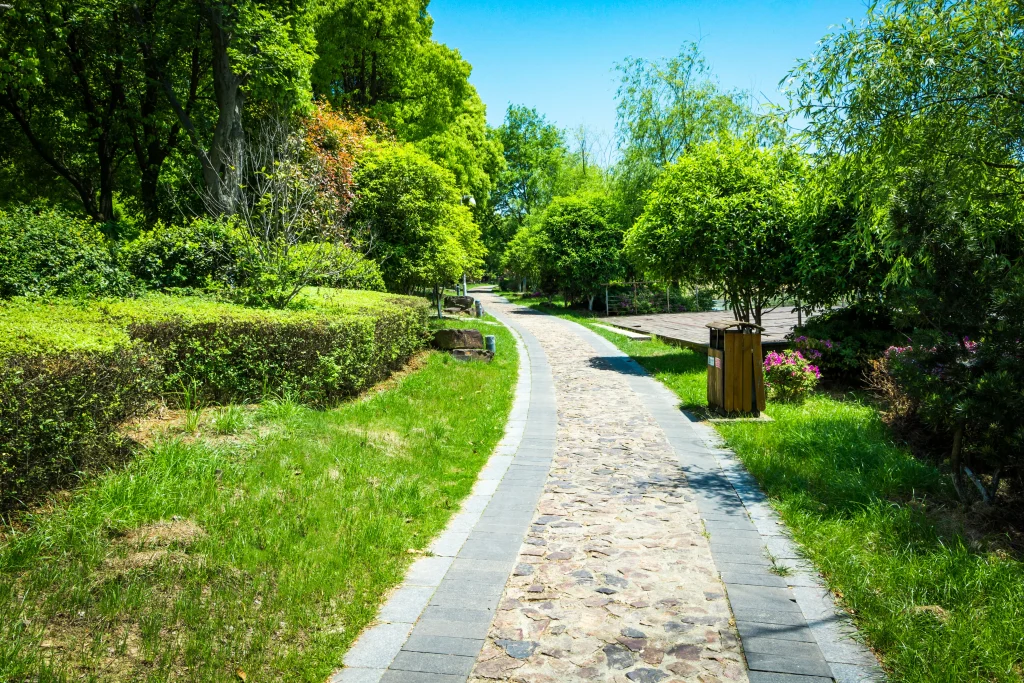Rubber mulch – made from recycled tires – is marketed as a long-lasting, low-maintenance alternative to traditional organic mulch. But is rubber mulch good for your garden, especially in Denver’s climate?
As Denver landscaping professionals, we’ve seen homeowners attracted to rubberized mulch for its durability and minimal upkeep. However, the question “is rubber mulch safe” for plants, soil health, and the environment deserves a thorough answer before you invest in this material.
In this comprehensive guide, we’ll break down:
- What tire mulch is and how it’s manufactured
- Rubber mulch pros and cons
- Whether rubber mulch is dangerous for your soil, plants, and pets
- Best uses for rubber mulch in Denver landscaping
Whether you’re considering rubber mulch, this guide will help you make an informed decision that’s best for your landscape and the environment.
What is rubber mulch?
Rubber mulch is a landscaping material created by shredding recycled tires into small chips or nuggets. These pieces are processed to remove steel belts and other metal components, then cleaned and often dyed in natural colors like brown, black, or red to mimic wood mulch.
The manufacturing process involves:
- Collection of used tires from recycling centers
- Shredding into uniform pieces (typically 1/2 to 3/4 inch)
- Metal removal using magnetic separators
- Cleaning to eliminate contaminants
- Coloring with synthetic dyes (optional)
This recycled tire mulch diverts millions of tires from landfills annually, which manufacturers promote as an environmental benefit. However, as we’ll explore, the environmental impact is more complex than it appears.
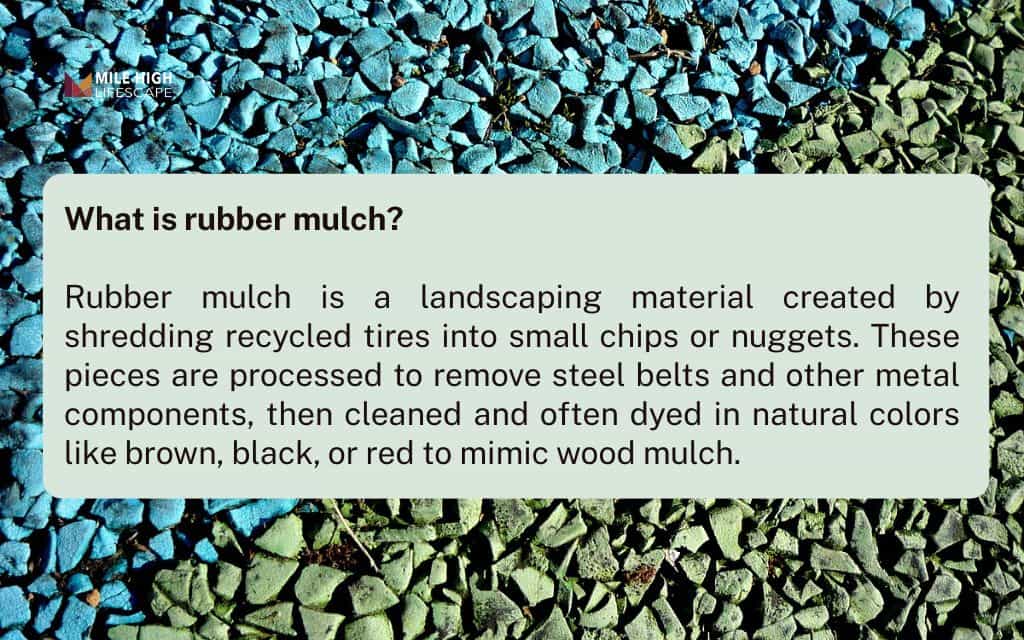
Benefits of rubber mulch
Rubber mulch does offer legitimate advantages, particularly for specific landscaping applications. Understanding these benefits of rubber mulch helps you determine where it might be appropriate for your property.
Longevity and low maintenance
The most significant advantage of landscape rubber mulch is its durability:
- Doesn’t decompose, meaning you rarely need to replace it
- Lasts 8-10 years or longer, compared to 1-2 years for wood mulch
- Resistant to Denver’s harsh freeze-thaw cycles that break down organic materials
- No annual top-dressing required, saving time and money on maintenance
Excellent water drainage
Rubber mulch allows water to pass through easily without becoming waterlogged:
- Prevents water pooling around plant bases
- Maintains permeability even after rain or irrigation
- Reduces standing water that can attract mosquitoes
This drainage benefit makes tire mulch appealing for areas prone to runoff or poor soil drainage.
Superior weed suppression
The dense, compacted nature of rubber bark provides effective weed control:
- Blocks sunlight from reaching weed seeds
- Creates a physical barrier that’s difficult for weeds to penetrate
- Maintains effectiveness for years without breaking down
When installed with proper landscape fabric, rubber mulch can nearly eliminate weeding in certain applications.
Non-flammable properties
In Colorado’s wildfire-prone environment, fire resistance matters:
- Less prone to ignition from embers compared to dry wood mulch
- Doesn’t fuel fires the way organic materials do
- Particularly valuable in Denver’s dry summers and foothill properties
- Provides peace of mind in fire-prone neighborhoods
However, it’s important to note that while rubber mulch is more fire-resistant than wood, it can still melt and produce toxic smoke if exposed to direct flame.
Pest resistance
Landscaping with rubber mulch eliminates many pest-related problems:
- Unappealing to termites
- Doesn’t attract ants or provide nesting material for rodents
- Ideal for tree bases where carpenter ants often nest in decomposing wood
- Reduces pest control costs over time
Made from recycled materials
From a waste management perspective, rubber mulch offers environmental appeal:
- Diverts millions of scrap tires from landfills annually
- Provides a second life for materials that otherwise persist for centuries
- Reduces demand for newly manufactured landscaping products
- Seen as “green” reuse of waste materials
However, this apparent environmental benefit must be weighed against the potential problems with rubber mulch we’ll discuss in the next section.
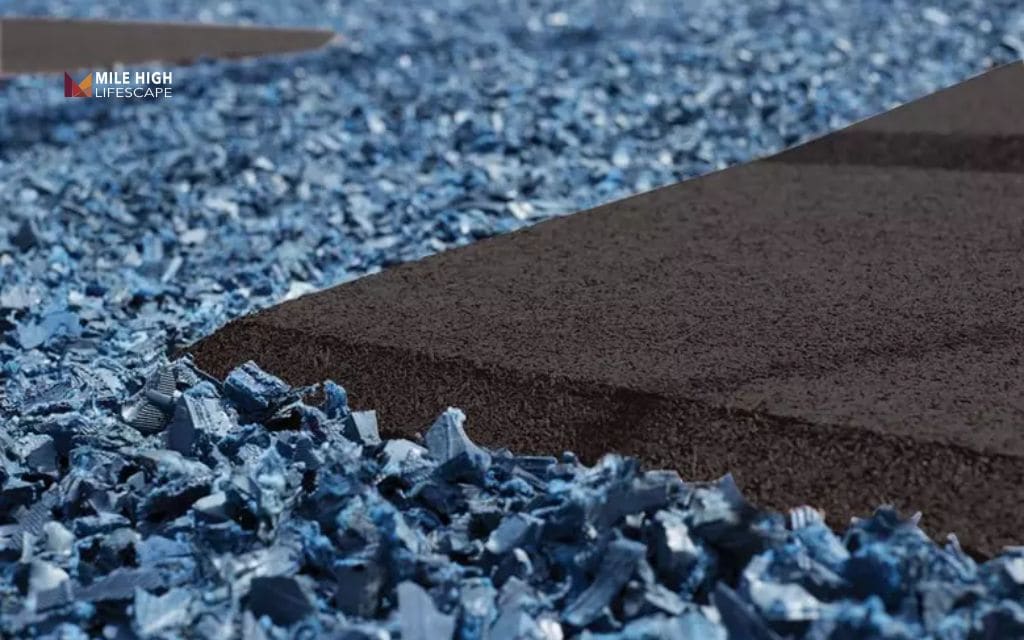
Drawbacks of rubber mulch
While durable and low-maintenance, rubber mulch isn’t ideal for living gardens. Here are the science-backed concerns that make many Denver gardeners think twice about tire mulch.
Chemical leaching and heavy metal contamination
The most significant concern about whether rubber mulch is dangerous centers on chemical contamination:
- Studies demonstrate that small amounts of zinc and other heavy metals leach from rubber mulch over time.
- Polycyclic aromatic hydrocarbons (PAHs) – known carcinogens – can migrate into surrounding soil
- High zinc concentrations can be toxic to sensitive plants and beneficial soil organisms
- Long-term accumulation in soil may impact plant health
Colorado’s alkaline soils (pH 7.5-8.5) and limited rainfall actually reduce the rate of leaching compared to acidic, wet climates. However, this means:
- Toxins that do leach remain in soil longer due to slow natural detoxification
- Build-up may persist for years or decades
- Eventual contamination becomes more concentrated over time
Zero soil enrichment
Unlike organic mulches that decompose and feed the soil ecosystem, rubber mulch provides no nutritional benefit:
- Doesn’t break down into humus or organic matter
- Fails to feed soil microbes, earthworms, and beneficial organisms
- Can create hydrophobic conditions when compacted, actually repelling water
- May inhibit mycorrhizal fungi that help plants absorb nutrients
Over time, plants mulched with rubber may show:
- Stunted growth from depleted soil nutrition
- Reduced drought tolerance as soil structure deteriorates
- Increased susceptibility to disease without beneficial microbes
- Declining vigor as organic matter isn’t replenished
This is why experts advise against using rubber mulch for vegetable gardens or perennial flower beds where soil vitality matters.
Heat retention and root stress
Rubber’s dark color and composition make it absorb and radiate significant heat:
- Rubber mulch can increase soil temperature compared to organic mulch
- In Denver’s intense summer sun, this effect intensifies
- Root zones heat up, stressing shallow-rooted plants and drying out soil
Does rubber mulch kill plants directly? Rarely. But chronic heat stress weakens plants and makes them vulnerable to pests and disease.
Odor and VOC emissions
Newly installed shredded tire mulch releases unpleasant smells and harmful compounds:
- Strong “tire smell” can persist for weeks or months, especially in hot weather
- Volatile organic compounds (VOCs) off-gas under high temperatures
- Benzene, toluene, and other chemicals may be released at low levels
- Odor intensifies during Denver’s hot summer days when sun hits the mulch directly
While VOC levels typically fall within EPA safety standards, sensitive individuals may experience headaches or respiratory irritation. The smell alone deters many gardeners from using rubber mulch near patios or windows.
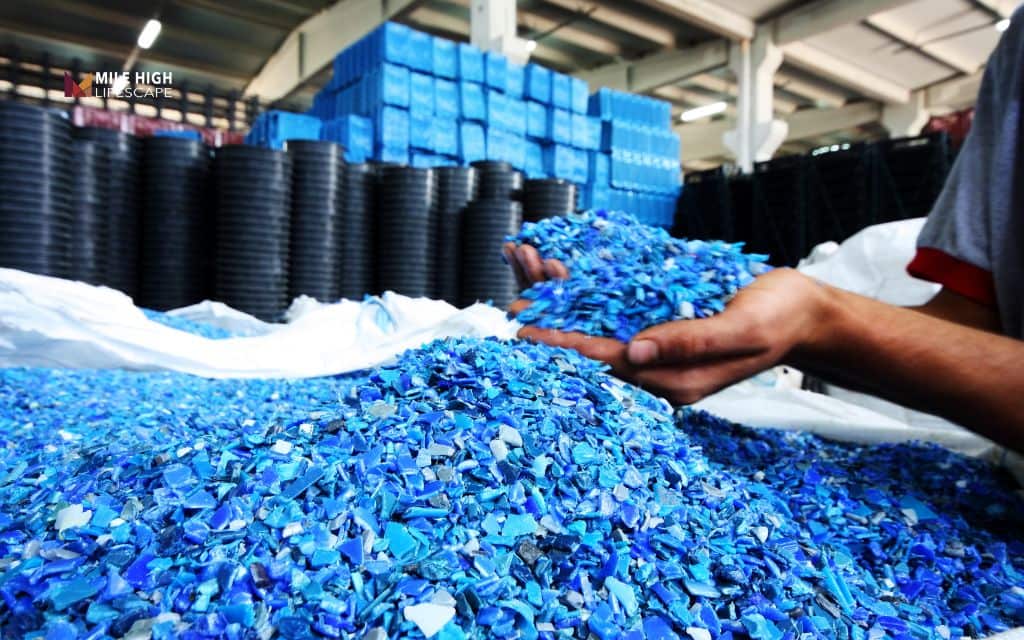
Flotation and migration issues
Despite its weight, rubber mulch can shift during Colorado’s weather extremes:
- Lightweight pieces float during heavy spring runoff or intense summer thunderstorms
- Wind can scatter loose mulch across lawns and gardens
- Snowmelt causes shifting, requiring reshaping each spring
- Requires landscape edging or barriers to contain, adding to installation costs
Difficult removal and replacement
Once installed, rubber mulch becomes a long-term commitment:
- Mixes with soil over time, making clean removal nearly impossible
- Contaminates compost if accidentally collected with plant debris
- Requires manual screening or complete soil replacement to remove
- Disposal challenges since it can’t be composted or easily recycled
Many landscapers report that removing old rubber mulch is one of their most labor-intensive and frustrating tasks.
Is rubber mulch good for plants, pets, and the environment?
The question “is rubber mulch safe” doesn’t have a simple yes-or-no answer. Safety depends on the specific application and what you value most in your landscape.
For plants
The material works for ornamental or non-rooted areas like trees and paths. Research indicates rubber mulch is bad for plants in vegetable gardens or pollinator gardens. Potential zinc toxicity affects acid-loving species or delicate perennials.
For pets
Rubber mulch is generally non-toxic once cured, but presents a choking hazard for dogs that chew. Avoid use in areas with heavy pet traffic unless sealed with landscape edging. The small pieces can stick to pet fur and be tracked indoors.
For the environment
The material reuses waste tires and reduces landfill burden. However, long-term microplastic generation and soil contamination present risks.
If sustainability guides your decisions, opt for certified recycled rubber from reputable sources meeting ASTM or EPA standards. Even certified products carry environmental concerns that organic alternatives avoid.
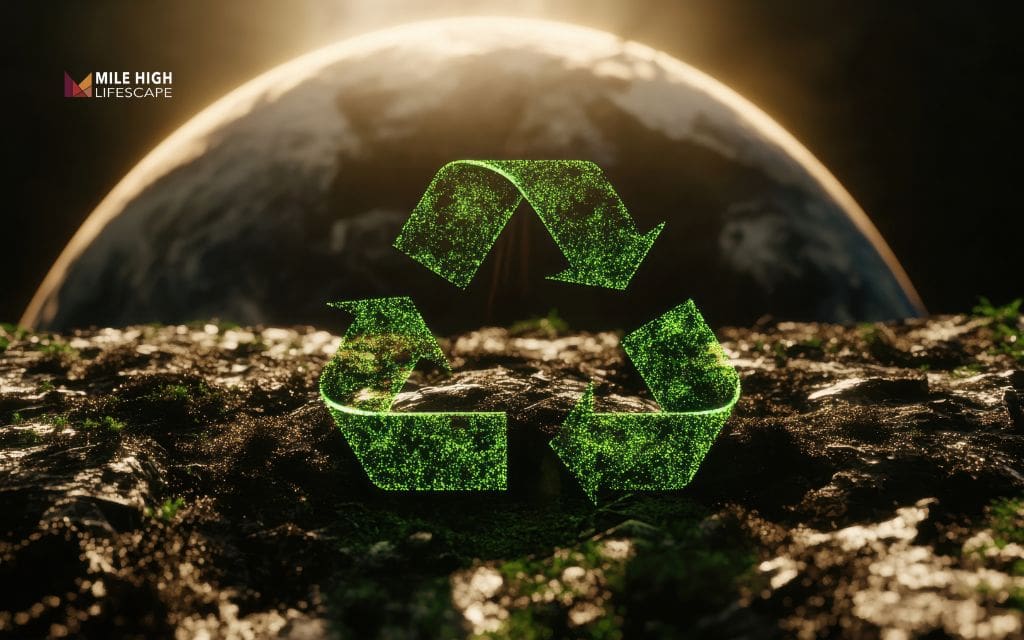
Rubber mulch vs. organic mulch – Which is better?
| Feature | Rubber Mulch | Organic Mulch |
| Longevity | 8 – 10 years | 1 – 2 years |
| Soil Health | No benefit | Improves structure and nutrients |
| Weed Control | Strong | Moderate |
| Water Retention | Medium | High |
| Heat Absorption | High | Moderate |
| Cost | Higher upfront | Lower overall |
| Eco Impact | Mixed | Positive |
| Best For | Playgrounds, paths, decorative beds | Vegetable gardens, flower beds, trees |
For Denver landscaping, combine both approaches: use rubber mulch in dry, non-plant areas and organic mulch where soil fertility matters. This strategy maximizes benefits while minimizing rubber mulch problems in growing spaces.
Best uses for rubber mulch in Denver landscaping
If you decide rubber mulch is right for specific areas of your property, here are the applications where landscape rubber mulch performs best in Colorado’s climate:
Playgrounds and backyard play zones
Rubber mulch excels in children’s play areas:
- Shock-absorbent properties cushion falls (6-12 inch depth recommended)
- Doesn’t splinter like wood chips
- Stays in place better than pea gravel
- Dries quickly after thunderstorms
- Long-lasting through years of active use
Tree rings and borders
Non-edible tree bases benefit from rubber mulch’s durability:
- Keeps weeds out without annual reapplication
- Minimal maintenance
- Pest-resistant unlike decomposing wood
- Prevents trunk rot from moisture-holding organic mulches
- Keep 6-inch clearance from trunk to allow bark to breathe and prevent moisture buildup.
Dog runs and kennel areas
Pet-focused spaces gain practical advantages:
- Easy to clean – hose off waste without replacing material
- Doesn’t harbor fleas or create muddy conditions
- Pest-resistant (no ant hills or rodent nests)
- Durable against digging and heavy traffic
- Provides cushioning for active dogs
- Need to monitor dogs that chew or eat non-food items. Rubber pieces pose choking and blockage risks.
Decorative alternatives to rock mulch
Rubber mulch offers aesthetic versatility:
- Available in multiple colors to match landscape design
- Lighter weight than stone
- Softer texture than sharp gravel
- Doesn’t fade as quickly as dyed wood mulch (though fading still occurs)
Commercial and rental properties
Property managers appreciate rubber mulch’s economics:
- Long lifespan reduces annual landscaping budgets
- Low maintenance minimizes service calls
- Professional appearance lasts years without refreshing
- Tenant complaints minimized by durability
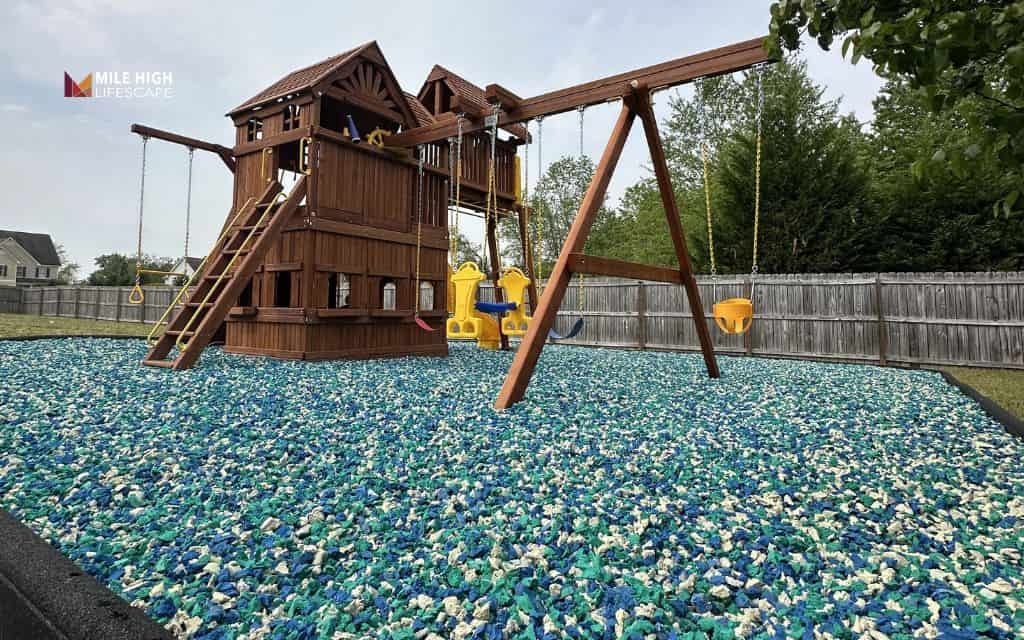
Conclusion
Is rubber mulch good for your garden? The material has clear advantages but environmental and plant health trade-offs make it less ideal for living garden spaces.
Rubber mulch works best for decorative beds, playgrounds, and non-plant zones. Avoid it for flower beds, vegetable gardens, or pollinator areas.
For Denver gardeners aiming for sustainability and plant vitality, organic or mineral mulches like bark, compost, or crushed granite provide better long-term value and environmental harmony.
__________
Mile High Lifescape has been proudly serving the Denver Metro area as the go-to landscape company. With a reputation for excellence, we offer a comprehensive range of friendly and professional landscaping and lawn care services, including expert mulching installation services.
Count on us to transform your outdoor space into a beautiful oasis that exceeds your expectations.
Contact us at (303) 877-9091 or hello@milehighlifescape.com for a free consultation.
Frequently asked questions (FAQ)
Does rubber mulch kill plants?
It does not kill plants directly, but it can trap heat and block air exchange, stressing sensitive species. The heat retention in intense sun creates root zone temperatures that many plants cannot tolerate. Vegetable gardens and pollinator plants show the most stress under this material.
Does rubber mulch fade?
The high-altitude sunlight is more intense than at sea level, accelerating the fading process. Faded rubber mulch landscape installations lose their aesthetic appeal faster than in lower-elevation regions.
Is rubber mulch dangerous for the environment?
It may leach chemicals over time, especially in wet or acidic conditions. The long-term microplastic generation raises concerns about soil and groundwater contamination. Tire rubber contains compounds that do not naturally occur in garden ecosystems.
How long does rubber mulch last?
The material lasts up to 10 years or longer, depending on sun exposure and maintenance. Denver’s intense UV radiation may shorten this lifespan compared to more humid, overcast climates. Proper installation with edging extends durability.
Can I mix rubber and organic mulch?
Mixing these materials is not recommended. The combination complicates maintenance and may trap moisture unevenly. When you later want to remove rubber pieces, separating them from decomposed organic matter becomes nearly impossible. This creates soil quality issues for future plantings.
